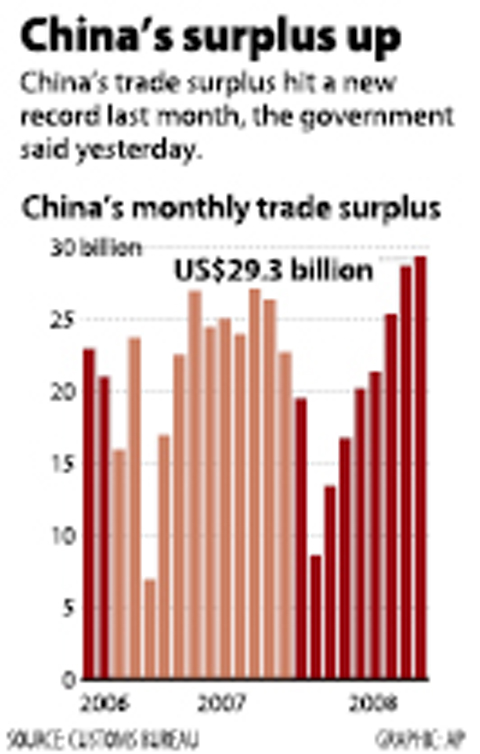China’s trade surplus widened to a record last month as exports withstood the global economic slowdown and falling commodity prices reduced the import bill.
Exports rose 21.5 percent from a year earlier to US$136.4 billion after gaining 21.1 percent in August, the customs bureau said on its Web site. The trade surplus climbed to US$29.3 billion, a figure derived by deducting the value of imports from the number for exports.
China has stimulated the world’s fourth-biggest economy by cutting interest rates twice in a month to counter the financial crisis. The surplus swelled a record US$1.8 trillion in foreign-currency reserves, which may help the nation maintain growth of more than 9 percent as a global recession looms.

“It’s not a bad thing to have a relatively large trade surplus when there’s a global financial crisis,” said Wang Qian (王黔), an economist at J.P. Morgan in Hong Kong.
“China’s foreign-currency holdings will help the country to survive the crisis,” Wang said.
The median forecasts in a survey of 13 economists were for export growth of 20 percent and a trade surplus of US$24.5 billion. The previous record was US$28.7 billion in August.
Imports increased 21.3 percent to US$107.1 billion after climbing 23.1 percent in the previous month. Falling prices for commodities such as copper and oil have trimmed the value of inward shipments.
Export growth is down from 25.7 percent for all of last year.
“Although the numbers look like China’s exports are holding up, the volume growth of exports has slowed to below 10 percent,” Wang said.
“Export growth will continue to weaken as the economic slowdown spreads from developed economies to emerging markets,” Wang said.
Export growth to the US slowed by 4.6 percentage points from a year earlier to 11.2 percent in the first nine months, the customs bureau said.
Trade with India “surged,” it said, with imports and exports together jumping 54.9 percent in the first nine months from a year earlier.
“Maybe world demand is providing a last gasp,” said Ben Simpfendorfer, an economist with Royal Bank of Scotland Plc in Hong Kong.
“Look for a sharp slowdown in the fourth quarter. The final two months of the year will be particularly weak as electronics exports are typically shipped during this period and they are the export sector’s growth engine,” he said.
China’s latest cut in borrowing costs, which reduced the one-year lending rate to 6.93 percent, came last week as part of an emergency coordinated bid to thaw credit markets.
The US Federal Reserve, the European Central Bank and four other central banks also lowered borrowing costs.

Intel Corp chief executive officer Lip-Bu Tan (陳立武) is expected to meet with Taiwanese suppliers next month in conjunction with the opening of the Computex Taipei trade show, supply chain sources said on Monday. The visit, the first for Tan to Taiwan since assuming his new post last month, would be aimed at enhancing Intel’s ties with suppliers in Taiwan as he attempts to help turn around the struggling US chipmaker, the sources said. Tan is to hold a banquet to celebrate Intel’s 40-year presence in Taiwan before Computex opens on May 20 and invite dozens of Taiwanese suppliers to exchange views

Application-specific integrated circuit designer Faraday Technology Corp (智原) yesterday said that although revenue this quarter would decline 30 percent from last quarter, it retained its full-year forecast of revenue growth of 100 percent. The company attributed the quarterly drop to a slowdown in customers’ production of chips using Faraday’s advanced packaging technology. The company is still confident about its revenue growth this year, given its strong “design-win” — or the projects it won to help customers design their chips, Faraday president Steve Wang (王國雍) told an online earnings conference. “The design-win this year is better than we expected. We believe we will win

Chizuko Kimura has become the first female sushi chef in the world to win a Michelin star, fulfilling a promise she made to her dying husband to continue his legacy. The 54-year-old Japanese chef regained the Michelin star her late husband, Shunei Kimura, won three years ago for their Sushi Shunei restaurant in Paris. For Shunei Kimura, the star was a dream come true. However, the joy was short-lived. He died from cancer just three months later in June 2022. He was 65. The following year, the restaurant in the heart of Montmartre lost its star rating. Chizuko Kimura insisted that the new star is still down

While China’s leaders use their economic and political might to fight US President Donald Trump’s trade war “to the end,” its army of social media soldiers are embarking on a more humorous campaign online. Trump’s tariff blitz has seen Washington and Beijing impose eye-watering duties on imports from the other, fanning a standoff between the economic superpowers that has sparked global recession fears and sent markets into a tailspin. Trump says his policy is a response to years of being “ripped off” by other countries and aims to bring manufacturing to the US, forcing companies to employ US workers. However, China’s online warriors